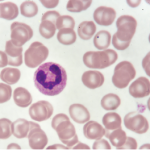In follow-up questions from the audience, Dr. Herrmann explained that colchicine, a traditional gout therapy, delays NETosis, although how this happens is difficult to explain.
Susan Bernstein is a freelance medical journalist based in Atlanta.
ad goes here:advert-1
ADVERTISEMENT
SCROLL TO CONTINUE
Reference
- Schauer C, Janko C, Munoz LE, et al. Aggregated neutrophil extracellular traps limit inflammation by degrading cytokines and chemokines. Nat Med. 2014 Apr 28(5);20:511–517.


